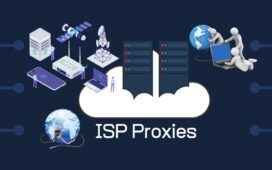What is a Private Proxy Server and Why Do You Need One?
In the digital age, privacy and security have become paramount concerns for individuals and businesses alike. One tool that can help safeguard online activities is a private proxy server. But what exactly is a private proxy server, and why do you need one?
A private proxy server acts as an intermediary between your device and the internet. It allows you to browse the web anonymously by masking your IP address, making it difficult for websites to track your online activities. Unlike public or free proxy servers, which are often overcrowded and unreliable, private proxy servers offer dedicated resources exclusively for your use.
There are several reasons why you might need a private proxy server. Firstly, it enhances your online privacy by preventing websites from collecting data about your browsing habits or location. This can be particularly important when accessing sensitive information or conducting business transactions.
Secondly, a private proxy server, such as proxy-seller.com offers, enables you to bypass geo-restrictions imposed by certain websites or streaming platforms. By connecting through a server located in a different country, you can access content that may otherwise be unavailable in your region.
Lastly, businesses may find private proxy servers useful for various purposes such as market research, web scraping, or social media management. By utilizing dedicated proxies, companies can gather data more efficiently without being blocked or flagged by websites.
If you’re considering purchasing a private proxy server, it’s important to choose a reputable provider that offers reliable connections and excellent customer support. While there are free options available, investing in a paid service ensures better performance and greater security.
In conclusion, a private proxy server offers anonymity and security while browsing the internet. Whether you want to protect your personal information or access restricted content, having a dedicated proxy server can provide peace of mind in an increasingly interconnected world.
The Benefits of Using a Private Proxy Server for Your Online Activities
Using a private proxy server offers a range of benefits for individuals and businesses alike. One of the primary advantages is secure browsing, as a private proxy acts as an intermediary between your device and the websites you visit. This ensures that your online activities remain anonymous, protecting your sensitive data from potential threats.
Data privacy is another key benefit of using a private proxy server. By routing your internet traffic through a proxy, you can shield your personal information from prying eyes, including hackers and data trackers. This added layer of security helps safeguard against identity theft and unauthorized access to your online accounts.
Additionally, private proxies allow users to bypass geo-restrictions imposed by websites or streaming platforms. By connecting to a proxy server in a different location, you can access content that may be restricted in your region. This is particularly useful for individuals who want to enjoy unrestricted access to streaming services or access websites that are blocked in their country.
For businesses involved in web scraping or social media management, private proxies are essential tools. Web scraping involves extracting data from websites on a large scale, and using proxies allows businesses to scrape data without being detected or blocked by the website’s security measures. Similarly, social media management tools can utilize proxies to manage multiple accounts simultaneously without triggering any suspicious activity flags.
In summary, using a private proxy server provides secure browsing, protects data privacy, enables bypassing geo-restrictions, and facilitates web scraping and social media management tasks. Incorporating this technology into your online activities can enhance both security and efficiency while ensuring uninterrupted access to desired content and services.
Factors to Consider When Choosing a Private Proxy Server Provider
When it comes to choosing a private proxy server provider, there are several important factors to consider. These factors can greatly impact your browsing experience, security, and overall satisfaction with the service. In this section, we will discuss some key considerations that should guide your decision-making process.
Reliability is paramount when selecting a proxy server provider. You want to ensure that the provider has a solid track record of uptime and minimal downtime. A reliable service will ensure that you have uninterrupted access to the internet and can browse without any disruptions.
Speed and performance are also crucial factors to consider. A good proxy server should offer fast connection speeds and low latency. This is especially important if you plan on using the proxy for activities such as streaming or online gaming, where lag or buffering can be highly frustrating.
The location options provided by the proxy server provider are another aspect worth evaluating. Depending on your needs, you may require proxies from specific locations around the world. Whether it’s for accessing region-restricted content or conducting market research in different countries, having a wide range of location options can be beneficial.
Lastly, don’t overlook the importance of customer support. A reliable and responsive customer support team can make all the difference when encountering technical issues or needing assistance with setup and configuration. Look for providers that offer 24/7 support through various channels like live chat or email.
By considering these factors – reliability, speed and performance, location options, and customer support – you can make an informed decision when choosing a private proxy server provider that best suits your needs.
Different Types of Private Proxy Servers and Which One is Right for You?
When it comes to private proxy servers, there are different types available, each with its own unique features and benefits. Two common types of private proxy servers are shared proxies and dedicated proxies.
Shared proxies are used by multiple users simultaneously. They offer a cost-effective solution as the cost is divided among the users. However, since they are shared, the speed and performance may be affected if other users on the same server engage in high-bandwidth activities or misuse the proxy.
On the other hand, dedicated proxies provide exclusive access to a single user. This means that you have full control over the proxy server’s resources and bandwidth. Dedicated proxies offer enhanced security and faster speeds since you don’t have to share them with others. However, they tend to be more expensive compared to shared proxies.
Another aspect to consider when choosing a private proxy server is whether you prefer residential or datacenter proxies.
Residential proxies use IP addresses provided by Internet Service Providers (ISPs). They mimic real user behavior as they are assigned to physical locations. Residential proxies are ideal for tasks that require anonymity and bypassing geo-restrictions since they appear as regular residential IP addresses.
Datacenter proxies, on the other hand, are not associated with an ISP or physical location. They are created in data centers and offer high-speed connections with lower costs compared to residential proxies. Datacenter proxies are commonly used for tasks that require high-speed scraping or accessing websites without being detected.
Ultimately, choosing the right type of private proxy server depends on your specific needs and budget. Consider factors such as speed, security, budget constraints, and intended use when deciding between shared vs dedicated proxies or residential vs datacenter proxies for your copywriting needs.
Where to Buy the Best Private Proxy Servers in the Market
When it comes to purchasing private proxy servers, it is important to choose a provider that offers top-notch service and reliability. With the increasing demand for online privacy and security, there are numerous options available in the market. However, not all proxy providers are created equal.
To ensure that you are getting the best private proxy servers, it is recommended to do thorough research and consider factors such as reputation, customer reviews, and pricing. Look for trusted proxy sellers who have a proven track record of providing reliable and secure services.
Reputable proxy service providers often offer a range of packages tailored to different needs and budgets. They prioritize security measures such as encryption protocols and IP authentication to ensure that your online activities remain anonymous and protected.
It is also worth considering additional features offered by the proxy provider, such as dedicated customer support, server locations across various countries, and compatibility with different devices or operating systems.
By taking the time to find a reputable provider among the top private proxy sellers in the market, you can ensure that you have access to reliable proxies that meet your specific requirements for privacy and online security.
Tips for Setting Up and Configuring Your Newly Purchased Private Proxy Server
Setting up and configuring a private proxy server can be a daunting task, especially for those who are not familiar with the technicalities involved. However, with the right guidance and knowledge, this process can become much easier. In this section, we will provide you with some useful tips to help you set up and configure your newly purchased private proxy server.
Firstly, it is important to understand the purpose of a proxy server. A proxy server acts as an intermediary between your device and the internet. It allows you to browse the web anonymously by masking your IP address and encrypting your online activities.
To begin the setup process, you will need to choose a reliable proxy service provider that offers private proxies. Once you have purchased a subscription or plan from them, they will provide you with the necessary information such as IP address, port number, username, and password.
Next, let’s discuss how to configure proxy settings on different devices and browsers:
1. Configuring Proxy Settings on Windows:
– Go to “Settings” > “Network & Internet” > “Proxy”.
– Enable “Use a proxy server” option.
– Enter the IP address and port number provided by your proxy service provider.
– If required, enter your username and password.
2. Configuring Proxy Settings on macOS:
– Go to “System Preferences” > “Network” > “Advanced”.
– Click on the “Proxies” tab.
– Select the type of protocol (HTTP/HTTPS) for which you want to configure the proxy settings.
– Enter the IP address and port number provided by your proxy service provider.
3. Configuring Proxy Settings on iOS:
– Go to “Settings” > “Wi-Fi”.
– Tap on the connected Wi-Fi network name.
– Scroll down and tap on “Configure Proxy”.
– Select either Manual or Automatic option based on your preference.
4. Configuring Proxy Settings on Android:
– Go to “Settings” > “Network & Internet” > “Wi-Fi”.
– Long press on the connected Wi-Fi network name.
– Tap on “Modify Network”.
– Scroll down and enable the “Advanced Options”.
– Select “Manual” under the Proxy section.
– Enter the IP address and port number provided by your proxy service provider.
When it comes to configuring proxy settings on different browsers, the process may vary slightly. However, most modern browsers offer similar options to configure proxy settings.
In conclusion, setting up and configuring a private proxy server can be simplified by following these tips. Remember to carefully follow the instructions provided by your proxy service provider and adjust the settings according to your device and browser specifications. By doing so, you can enjoy a secure and anonymous browsing experience with your newly purchased private proxy server.







